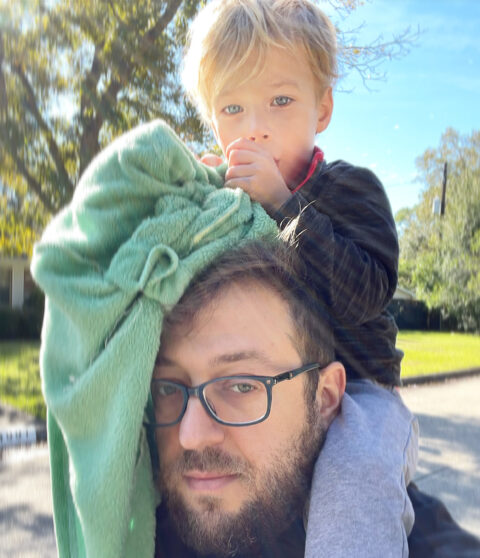“The Living Water” vividly explores the idea of escape on so many levels: physical escape from the flood, via the hatchet, the rake, by rescuing objects from the water; but also, perhaps more poignantly, escape from the “old life” before the flood, as in the final scene where the main character chooses not to let go, but to be drawn deeper into the floodwater. What inspired you to write about this?
Just weeks after we’d bought and moved into our first house, folks started saying that this Harvey was shaping up to be a doozy. I think about that night a lot.
I’m embarrassed by the degree to which my writing still draws from lived experience, as though it implies a poverty of imagination. But when I go to write, that’s what comes out, these moments I cannot escape. They have a hold on me. Mostly humiliations and screw-ups, people I’ve hurt or disappointed. Selfishness, stupidity. Maybe if I put them into words and do the work to find what is universal or true or beautiful about my experiences, maybe then they’ll let me go.
Tell us something we might not have expected about your creative process and approach to storytelling.
In my own creative work, I lack discipline. I have no schedule for writing, no one place where all the notes and false starts are stored. I try to oblige every impulse. Just keep on diving in, grab hold of something, pull it out, see what it is.
When the time comes, when I think I’ve found something, a destroyed notebook is best. Go to a thrift store, buy a crummy old notebook for less than a dollar. Look for warped, yellowed pages. Rip the cover off. Now it is trash and you are free to write in it without the fear of spoiling some expensive leather-bound journal.
Near the middle of the story, the main character pulls objects out of the floodwater—objects that become more and more visceral and surreal, introducing a powerful sense of nostalgia and introspection rooted in the main character’s life before the flood: “a popcorn bowl heavy with fried rice and kung pao chicken”; “an unread copy of Atlas Shrugged“; “a wart I sliced off, a bedsheet I ruined, and a nipple I kissed.” What moment of nostalgia have you carried with you that continues to inform you as a person, as a writer?
When I was a kid, Dad always said I had to find something to motivate me. He said I needed a reason to get out of bed in the morning.
But I was lazy and eager to quit anything that didn’t come easily.
One night in seventh grade, it was my turn to use the family computer. Having nothing else to do, I wrote a play. With no idea how to write a play, with no particular experience with the theater, and with no incentive other than I’d thought of it and wanted to see it through.
They pulled me out of some class and let me work on my play with teachers. This led to theatre in high school, where another teacher produced and directed another play I’d written, which got me into college, where I studied literature and psychology and wrote another play which was also produced and directed by faculty, which got me into graduate school, which then offered me a spot in their school of education so I could become a teacher. The trajectory of my entire life can be traced back to a night when at thirteen I sat down to write for no other reason than it was my turn on the computer. It’s a lesson I try to impart to my students, that writing should be a joyful and creative act of discovery.
Have you ever seen the pale face just beneath the surface of the water?
Not only have I seen the pale face in the water, I’ve even heard it speak.
It said, “There is a rabbi in the Talmud who heals the sick, but first he makes sure to ask each one, “Is your suffering dear to you?”
See, some people don’t know who they’d be without their afflictions.
Humor us: What do we find when the floodwater recedes?
The cute answer is that there’s, what, peace beneath the water? Sobriety? Rebirth and new life once all the unpleasantness is washed away?
Too sentimental.
I’ve got at least one student who will tell you there’s Death under the water, but that it is nothing to be feared.
I’m not so sure about all this. In my mind, if the water recedes, it’d mostly be just muck.
But the water never recedes, does it? Not really. It just floods someplace else.


